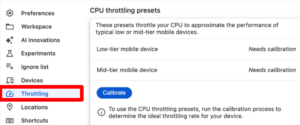Google Chrome Releases Smarter Mobile Testing Tools for Developers
April 8, 2025 — Google recently unveiled new mobile emulation capabilities in Chrome 134 to help developers more precisely simulate end-user performance in the real world. The spotlight of this new release is CPU throttling calibration in Chrome DevTools, something that will make the strong dev environment catch up with and blend in with underpowered mobile machines that end-users actually execute.

CPU Throttling Calibration
Before, developers were forced to resort to guesswork when simulating mobile CPU speeds. Chrome’s new calibration tool avoids that by running a quick test on the developer’s machine and generating two optimized presets:
- Low-end mobile, simulating basic entry-level phones
- Mid-end mobile, simulating average smartphone performance
Chrome Developers say that the mid-end preset is recommended for most testing scenarios, while the low-end version is used to identify problems in users on low-end devices.
Real-World User Data Blending
In addition to CPU calibration, Chrome 134 introduces a collection of features that marry real-world user data:
- Visiting suggestions by visitor data to sites
- Disparity alerts in between test and actual user experience
- Context-based performance details and recommendation
- Setting tracking of the test environment
Constraints of the Calibration Tool
Although the calibration improves JavaScript and layout performance testing accuracy, Chrome confesses it is not flawless. The tool is not a precise simulator for scenarios such as graphically intensive operations, slow storage, low memory, or thermally throttling on devices. For complex websites, real device testing still cannot be bypassed.
Significance for SEO and User Experience
This update is a significant move towards ensuring that performance optimizations developed in the lab result in better user experiences, which is critical to SEO success, engagement, and conversion rates as mobile usage remains dominant in global web traffic.

